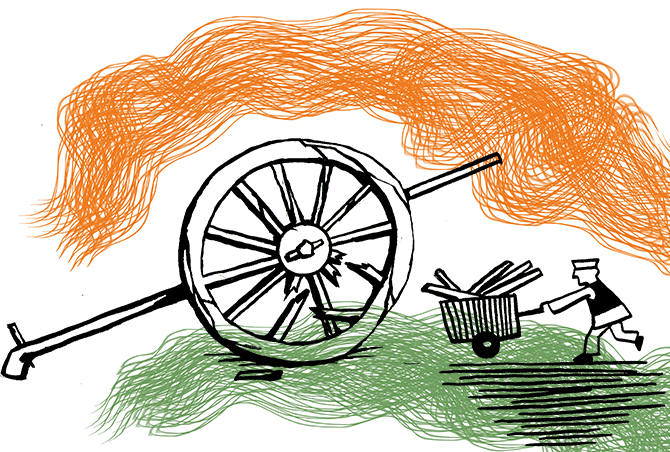'As long as there is PM-CARES, it's money that will do the talking,' notes Kanika Datta.

Corporate India may be wallowing in forced inactivity, but its publicity machinery remains as active as the COVID-19 virus.
The provocation for this PR pandemic is the government's decision to allow COVID-19-related expenditure within permitted corporate social responsibility (CSR) activity under the terms of the six-year-old mandate.
The March 23 announcement included donations to the prime minister's national relief fund within allowable CSR spending.
Five days later, Prime Minister Narendra Damodardas Modi offered companies an even better option in the clumsily labelled Prime Minister's Citizen Assistance and Relief in Emergency Situations, which conveniently translates to PM-CARES.
As atonement for serious lapses in governmental planning for migrant workers and others after the nation-wide lockdown, the creation of the fund may be unexceptionable.
As means of personal mobilisation --- so much better than clapping and thali-banging, for instance -- it remains unsurpassed.
The Modi-initiated PM-CARES, made effective through an ordinance, improves on the government's prime minister's national relief fund which Jawaharlal Nehru set up in 1948, on several counts.
First, it extends the same tax break on donations as the PM relief fund, but removes the upper limit of 10 per cent of the donor's gross income.
Second, companies can donate to this fund until the end of June and claim the deduction for FY20 tax returns.
Third, PM-CARES contributions will not affect the eligibility of companies to sign up for the concessional lower corporate tax regime announced in September last year to businesses that do not claim any tax relief.
These announcements offer significant relief for companies after draconian amendments to the Companies Act in July last year altering the quasi-mandatory 'pay or explain' mandate introduced by the United Progressive Alliance into a binding obligation.
Under these amendments, non-complying companies will attract penalties ranging from Rs 50,000 to Rs 25 lakh and/or imprisonment of officers for up to three years.
Under the rules, qualifying companies have to spend 2 per cent of their average profits for the past three years on specified CSR activities every year.
Mandate-qualifying companies -- those with turnover of Rs 1,000 crore or more, or net worth of Rs 500 crore or more, or profit of Rs 5 crore or more -- have three years to comply or have the money transferred to a government-specified fund.
Despite the finance minister's invocation of Mahatma Gandhi's truism on profit and social responsibility, the amendment unmistakably added to the climate of harassment that is encouraging business people to exit India in droves.
PM-CARES offers a handy panacea for CEOs's CSR headaches.
No surprise, then, that the excited phone calls from excitable PR executives touting this or that company's COVID-19 action plan began even before the reverberations from the PM's announcement faded away.
The usual avalanche of press releases followed, recording the lakhs and crores that India Inc is pouring into PM-CARES, just like all those Bollywood celebrities.
Assuming PM-CARES spends this money both wisely and well, this flood of donations is a great thing, whatever the motivations.
For instance, if it invests heavily in subsidising nationwide and sorely needed COVID-19 tests, that would be money well spent.
But two niggling doubts remains.
The first, which has been asked before, is the need for a separate fund when a 72-year-old set up with set procedures for disaster relief funding are already in place.
The weak explanation -- or non-explanation -- from the government is that this fund focuses on fighting COVID-19-type pandemics and enables personal contributions (which the prime minister's national relief fund also allows).
Even if we assume the supposed benefits of the special fund outweighs any political motives, the second point of unease centres on governance.
Like the prime minister's national relief fund, PM-CARES is a public charitable trust.
But where the first is governed from the PM's office by designated bureaucrats, the latter has the PM as chairman and the members include the ministers of defence, home and finance.
This specificity of management by the political executive is unsettling.
It suggests the establishment of a CSR-government complex with all the connotations of surveillance and quid pro quos.
Given this, the question to ask is whether PM-CARES's activities will be in the public domain in the same manner as the prime minister's national relief fund.
If the government was serious about co-opting the corporate sector meaningfully in the fight against COVID-19, it could have specified activities with durable benefits beyond cheque-writing.
Some private companies and public sector banks, for instance, have involved their CSR administrations in helping state governments provide food and shelter for migrants and quarantine centres.
Including, say, the provision of medical equipment and facilities to emerging under-served hotspots could have been another useful way of involving the resources of the corporate sector.
Or, let's look at the long term in making this mandate -- which is conceptually flawed in the first place -- work to fill in the serious gaps in India's health care infrastructure that this pandemic has exposed.
But as long as there is PM-CARES, it's money that will do the talking.












 © 2025
© 2025